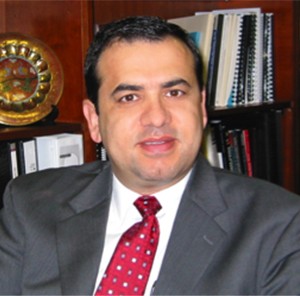Dr. Issa Batarseh on Power Electronics
Science alone isn’t enough to advance society.
UCF professor Issa Batarseh, Ph.D.—who, as an engineer, calls himself a technologist—believes the real key is using science to our advantage by creating the right technology. Science, he says, is ever-present, but only becomes impactful when forces of nature are discovered, controlled, mastered, and put to good use. This only happens when new technologies are created.
“Gravity is no longer fear and electricity is no longer magic. It’s always about science, of course, but the engine of progress is understanding the science to create technology. What really makes us all proud of it, of lifting our society into prosperity in a fundamental way, is the technology based on the science that we understood,” Batarseh explains.
—
Batarseh notes that the sun is a gigantic nuclear reactor in space which rains more energy down on the earth in an hour than is used in the entire world in one year. Passionate about turning what we’ve learned about the forces of nature—science—into technological progress, Batarseh exclaims, “It is meant to be used!”
The solar revolution must overcome common misunderstandings—namely, the perception that solar is too costly. “People think solar is too expensive, but we can generate solar energy at the price of gas and coal. With new research and technology it’s getting steadily cheaper. A problem – a challenge – has been the intermittency,” he says. He added, “but advancement in battery technology will address this challenge”.
A researcher in the field of power electronics, Batarseh has developed technology to convert and connect solar energy to the grid. Without this, the shifts in energy supply to the grid caused by changes in the available sunlight from an event such as a thunderstorm require a supplement of conventionally produced, non-renewable energy. Utility providers, intent on preserving grid security, want solar that is predictable and firm to avoid shifting power sources.
“That sudden power generation shift, to them, is disturbing,” he explains.
Until the day someone discovers how to store the sun’s energy competitively, Batarseh’s smart grid enhancement can safely integrate solar energy into our power grid. “It’s really the opportunity to bring several technologies together to create something more resilient, controllable, and efficient. The smart grid is the ability to use communication, software engineering, software system or expert system to control the power flow in the grid to make it resilient, reliable, cost-effective, and secure. And, the only way to make the grid secure is to have the smart intelligence on it,” he continues.
His field of power electronics provides circuits to manage and control power. A tool, he says, to help the next technological revolution—renewable energy. “It comes down to the weakest link. If the power processing unit is not smart and reliable, the whole system doesn’t work. So power electronics is a critical component to any design.”
Increasing interest in renewable energy, solar and wind, led to interest in power electronics. Batarseh’s students are like many students whose career choice is motivated by a desire to change the world for the better. This passion, he says, is the compelling factor in power electronics that takes it beyond theory and controls, which he calls, “boring stuff.”
“[My students] want to be doctors, teachers, environmentalists, green, so I say, don’t let them down – let them into that clean tech and smart grid revolution.”
He counts his 30 Ph.D. and 40 master’s students as the brightest moments in his career. “It’s about making a difference and getting relevant technology out there,” he says. “I don’t want research to become publication, publication, publication. I want technological research to become scholarly contribution in the private sector, a bridge that traverses the gap between science on the one side and society, business, and innovation on the other. Research should lead to something that people use, to benefit society. And that’s my passion, which is why I will always make sure my students understand that what they do is relevant and serves humanity.”
Batarseh’s own passion for research stems from its ability to make a difference in society, propel progress and promote prosperity. “When we do research, we don’t want to do research simply for the sake of publication or getting research funds – although this is also necessary as it enables research. Nor is research meant to display the number of citations, or journals on bookshelves.” In short, he feels research is all about making a worthwhile difference.
Batarseh credits UCF for his successes, citing the university’s leadership and passion for partnership both in the community and with industry, as well as well UCF’s ability to connect the lab with the marketplace: “Every time a technology gets transferred to the private sector, it’s a validation that we do relevant research.”
The misconception that solar energy is too expensive and out of reach for everyone to harness and use on a daily basis is being dispelled by Batarseh’s work in smart grid technology which promises to harness the sun’s infinite, clean energy for universal use in our everyday lives. To him, the potential of solar power and storage researched until now is just the tip of the iceberg.
